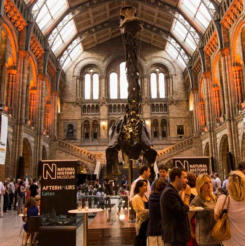Our weekly round-up of outlandish and interesting information collected from the corners of the charity sector.
Hmm. Let me think about it. No.
Extraordinary news from Wednesday’s meeting of the Public Accounts Committee. Lots of people seem to be happy with the Charity Commission and think it’s doing a good job.
Austin Mitchell, Labour MP for Grimsby and one of the committee’s crustier members, chose to link this almost-unheard of conclusion to the fact that the Commission’s budget had been slashed.
“In other words, anorexia works,” he said.
Well, no. Just because two things happened one after the other doesn’t mean they are related. If, to take a purely theoretical example, one of the august scribes at Civil Society News were to have a few ales at the Christmas party, and then shortly afterwards they were told they were going to get a pay rise, we cannot therefore infer that drunkenness causes success at work.* Although it may be worth trying out as a theory.
When the idea that cutting spending produces better results, it's always tempting to suggest the person involved tries it, by not collecting their pay any more, and seeing whether performance increases.
Civil Society Media would also like to point out that anorexia is quite a serious condition, and people die of it, and so on. So suggesting it works is possibly not the most sensitive thing ever.
We investigate regulatory language. Or do we?
The PAC is going to dominate this week’s Diary, in fact. At least partly because there’s something we really want to get off our chest.
At the same meeting, Paula Sussex, chief executive of the Commission, was asked how many investigations her organisation currently had open.
This apparently straightforward question was actually likely to cause some difficulty for Sussex. More than you’d think, certainly.
The reason is that the Commission has two levels of regulatory activity – the operational compliance case and the statutory inquiry.
During both of them, the Commission asks people questions, scrutinises accounts, examines sources, and generally tries to establish whether any wrongdoing occurs. Investigates, in short.
But despite this fact, the regulator continues to insist, against all rules of linguistics and common sense, that a compliance case is not an investigation, to the surprise of sector scribes who were hitherto unaware its bailiwick had expanded to include not just charities but the Oxford English Dictionary.
Last time Diary inquired what other word might be used to refer to an operational compliance case which could a) be understood by a non-policy wonk and b) fit easily in a headline, the Commission sent back a page and a half of guidance, which wasn’t the most helpful thing ever.
Sussex herself admitted during the PAC evidence session that these two classifications involved doing much the same thing, with the single difference that a statutory inquiry allowed the Commission to use its considerable information-gathering and enforcement powers, while a compliance case does not.
Sussex up until that point had found the evidence session plain sailing. She was confident, clear, on top of her brief, and was able to put right some of the wilder surmises of the more ill-informed members of the committee. But on this tricky topic she found herself unexpectedly caught in a cleft stick.
Diary suspects she quickly decided that the committee's firebreathing chair, Margaret Hodge, famous for her acerbic questioning of witnesses, would not tolerate the kind of arrant semantic legerdemain the sector has been subjected to for the last couple of years.
But on the other hand Sussex could hardly actually call a compliance case an investigation without leaving in tatters her organisation’s increasingly desperate assertions that they were no such thing.
Her solution? To refer to compliance cases as “investigations” instead of investigations. So maybe that’s what we’ll call them from now on.
To be or not trustee
Finally, while we’re on the subject, Diary was amused to hear Hodge announce at the same meeting that everyone should have declared an interest before the meeting started, because all of the committee members were charity trustees.
“Actually, I’m not,” piped up John Pugh, Liberal Democrat MP for Southport, sounding rather like the lone bloke who disagrees when the crowd in The Life of Brian shout "We’re all individuals".
But then he rather let the side down later on in the piece when he added: “Actually, it’s just occurred to me that maybe I am a trustee after all.”
Diary is hopeful, for the sake of the organisation involves, that he finds out fairly soon.
Diplodocus focus
Finally moving on from the dinosaurs of Parliament to, well, some dinosaurs, we carry the news that the Natural History Museum is facing opposition from just about everybody, or at least everybody on Twitter, after it said it would replace the skeleton of a diplodocus in its front hall with a full blue whale skeleton.
So far they’ve only outlined the bare bones of the idea. But it’s been enough for people to say some rather un-diplo-matic things.
Diary has some sympathy. People need to understand that the Natural History Museum has to move with the times. They can’t keep living in the past.
*Civil Society Media would like to point out that this is an entirely theoretical example and that all members of staff drank responsibly and no inappropriate discussions regarding remuneration took place at the Christmas party.










